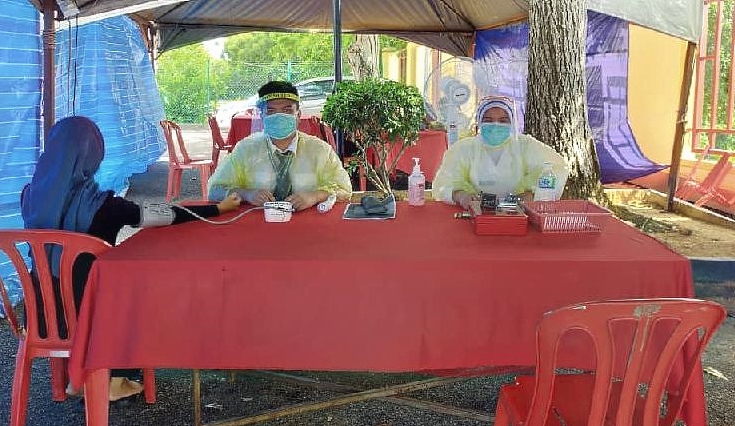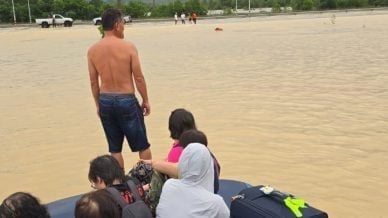
By Siew Nyoke Chow
"I heard Yayasan Sin Chew has N95 face masks. Can you donate some to our hospital? Our healthcare personnel are in severe lack of protective equipment."
That was a text message sent to my phone from Hospital Kuala Lumpur Director Dr Heric Corray on March 28.
"The surgical masks and PPEs we ordered from China will arrive in several days' time. I will send them over together with the N95 masks. Is that alright with you?"
"But we are urgently in need of N95 masks now! Can you please send them over first?"
I could feel the anxiety of Dr Corray about the personal safety of his staff. He is a really good leader who cares about his subordinates a lot.
All these days we have been receiving short messages from public hospitals and clinics from across the country seeking our donation of PPEs.
Each of these messages is pinching my heart, and keeps reminding me that our frontline doctors and nurses are facing tremendous threats. I feel particularly depressed for those messages we have been unable to fulfill their requests.
Some countries, including the US and UK, have experienced an even more acute shortage of PPEs due to their massive numbers of infections.
A doctor who wrote to British prime minister Boris Johnson urging him to provide PPEs to the country's medical personnel was himself killed by the virus three weeks after contracting it.
When picture of three UK nurses dressed in yellow color garbage bags improvised as PPEs went viral on social media, they had already tested positive for the coronavirus, and they were not the only cases of such in the country. Many other healthcare personnel in UK have been infected because they have not been adequately protected with PPEs. To date, 29 of them have died.
Gazing into the the picture of the three nurses on my computer, I prayed that this thing would not happen to our frontliners here in Malaysia.
Unfortunately things don't always happen the way we want them to.
The very next minute I received a call from a volunteer friend: "Hospital UKM needs isolation gowns and they asked us whether we had any raincoat for them to be improvised into isolation gowns." And Fo Guang Shan instantly sent over all the 1,000 raincoats they had to the hospital.
From what I have learned, after news that government hospitals were seriously lacking PPES broke out, organizations such as Fo Guang Shan, Tzu Chi Foundation, Young Buddhist Association of Malaysia, as well as other Christian, Catholic and Taoist voluntary organizations rushed to send in PPEs to various hospitals.
What really touched my heart was that a group of young Buddhist followers living in and around KL felt completely disheartened seeing frontline healthcare personnel trying to wrap themselves up tightly in garbage bags to minimize the risk of infection. They subsequently made their own isolation gowns at home with materials either provided by the hospital or acquired on their own.
When another volunteer friend of mine when to their homes to deliver the isolation gowns, she came to realize that quite a number of them were actually casual workers who lost their sources of income during MCO. Although they were in financial difficulty themselves, they were still holding out a hand to help.
That volunteer friend rang me up asking whether it was possible to contact textile factories which had to stop operating during MCO as well as volunteers to help as well.
These young Buddhist followers were well aware that most of the coronavirus victims at our hospitals were from different racial and religious backgrounds from them, but this would not deflect their powerful determination to help.
We cannot be just emotionally moved by the benevolent acts of these people but must jump into action ourselves. So we started looking around for protective equipment.
Thanks to the arrangements made by Venerable Jue Cheng, the first two batches of PPEs from China arrived. The third batch was stuck at the airport as the products did not pass the Chinese customs inspection for export.
I have learned a great deal of things while looking high and low for WHO-complaint PPEs, such as the difference between coveralls and isolation gowns. The doctors we came into contact with told us healthcare personnel taking care of COVID-19 patients at ICUs must put on coveralls and N95 masks, but due to the hot weather here, those treating non-ICU cases prefer isolation gowns and surgical masks instead.
I have noticed one thing: Many of the face masks donated by the public have been ordinary masks, not surgical masks because they do not know that wearing such ordinary masks will not protect the frontliners from infection risks.
When the HKL Director rang me up a second time for help, I had no choice but to spend double as much money to acquire a total of 2,800 N95 face masks from a local supplier.
We can't blame the supplier for marking up the price. It is not because they want to make a huge profit but because there is an actual shortage of raw materials that has sent production costs sharply higher.
The following day, Venerable Zhi Ping sent in a picture of healthcare personnel at a Melaka government clinic treating patients in raincoats. The doctors had requested that we supplied isolation gowns.
At the same time, a similar call requesting for isolation gowns was also received from Hospital Klang.
I couldn't turn a deaf ear to such pleas. So I approached a supplier whom we refused to buy from earlier on due to the high price he charged…
A friend asked me:
1. The health ministry has already received more financial allocations. Why don't they quickly buy those PPEs for the hospitals?
2. We have seen plenty of organizations donating protective equipment to hospitals. Why still not enough?
On the first question, I cannot answer on behalf of the health ministry.
As for the second question, HKL's Dr Heric Corray told me a doctor needs to change a N95 mask after seeing one COVID-19 patient and typically requires at least two sets a day. HKL needs several hundred sets of PPEs a day, along with some 2,000 isolation gowns. Hospital Sungai Buloh needs more, as it is specialized for the treatment of COVID-19 cases.
On April 13, director-general of health Datuk Dr Noor Hisham Abdullah openly pleaded to all quarters, including civic organizations, to donate PPEs to our frontliners. He admitted that the health ministry's PPE stock was only sufficient for the next 19 days!
During such a trying time we should all set aside our differences and offer our assistance. As for who should take responsibility for all this, we can always pursue it after the outbreak is contained much later.
Our public health system will collapse if more of our frontline healthcare personnel get infected, quarantined or killed because of PPE shortage, and this will invariably put all of our lives and safety to tremendous risks.
The fight still needs to go on. As for the frontliners battling the virus, they need the support and assistance from all the rest of us!
(Siew Nyoke Chow is Vice Chairman of Yayasan Sin Chew.)
ADVERTISEMENT
ADVERTISEMENT


































